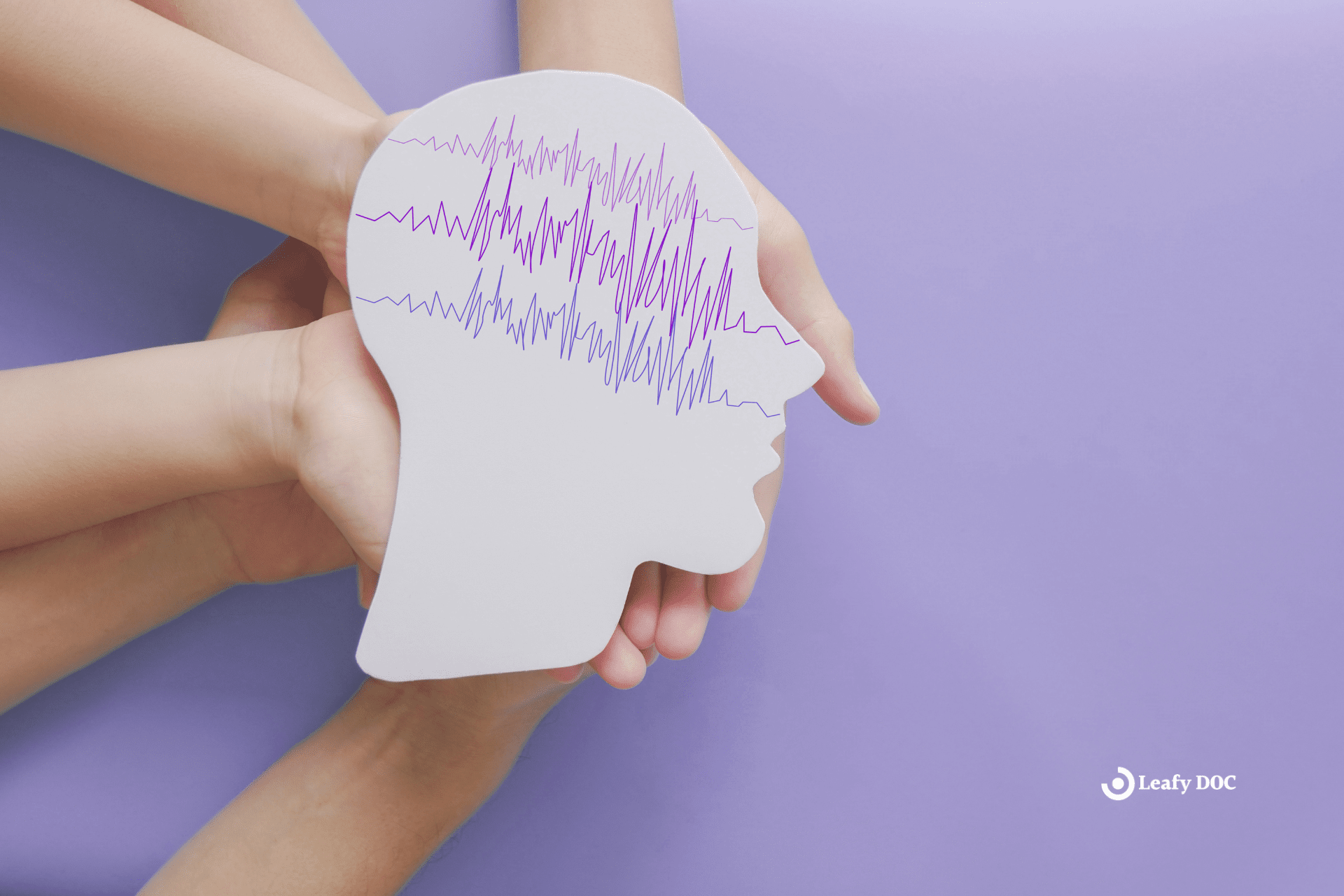Medical Marijuana and Epilepsy: A Review of the Latest Research
by Haley Mills · May 16, 2023
Explore the latest research on medical marijuana and epilepsy and discover how it can be used to manage seizures. Learn about the potential benefits and risks of using cannabis for epilepsy

Medical marijuana has been a topic of discussion and debate for years, with research slowly revealing its potential in treating various medical conditions. Epilepsy, a neurological disorder that affects millions worldwide, has emerged as one of the key areas where medical marijuana may offer significant benefits.
This comprehensive review will explore the connection between epilepsy and medical marijuana, discussing the latest scientific studies and clinical trials and examining the FDA-approved medication, Epidiolex. Furthermore, we will address frequently asked questions related to the use of medical marijuana for epilepsy, empowering patients and healthcare providers with the knowledge to make informed decisions.
Epilepsy: A Brief Overview
Epilepsy is a chronic neurological disorder characterized by recurrent, unprovoked seizures. These seizures result from abnormal electrical activity in the brain, leading to a temporary disruption in communication between nerve cells. The condition affects people of all ages, with approximately 65 million experiencing epilepsy worldwide.
There are many types of seizures, broadly categorized into focal (or partial) and generalized seizures. Focal seizures originate in a specific area of the brain, while generalized seizures involve both sides of the brain simultaneously. Symptoms of seizures can range from brief lapses in awareness to uncontrollable muscle spasms and loss of consciousness.
The causes of epilepsy are diverse and can include genetic factors, head trauma, infections, brain tumors, and other neurological conditions. In many cases, however, the cause remains unknown. Diagnosing epilepsy typically involves a thorough medical history, neurological examination, and various diagnostic tests such as electroencephalograms (EEGs) and brain imaging studies.
Treatment for epilepsy primarily aims to reduce the frequency and severity of seizures while minimizing side effects. The most common form of treatment is antiepileptic drugs (AEDs), which help control seizures in around 70% of patients. Alternative treatments such as surgery, ketogenic diets, or vagus nerve stimulation may be considered for those who do not respond well to medications.
Living with epilepsy can be challenging, as it can affect various aspects of an individual’s life, including work, school, and personal relationships. However, with appropriate treatment and support, most people with epilepsy can lead fulfilling and productive lives. As research into the condition and its treatments continues to evolve, medical marijuana has emerged as a promising option for those seeking alternative or supplementary approaches to managing their epilepsy.
Epilepsy: A Qualifying Condition for MMJ
As the medical community continues to explore the therapeutic potential of medical marijuana (MMJ), epilepsy has become one of the primary conditions for which MMJ is considered a viable treatment option. In recent years, an increasing number of states and countries have recognized epilepsy as a qualifying condition for medical marijuana use, expanding access to this alternative treatment for patients who struggle to manage their seizures through traditional methods.
The primary reason behind the growing interest in MMJ for epilepsy treatment is the presence of cannabinoids, the active compounds found in the cannabis plant. Among these, cannabidiol (CBD), a non-psychoactive compound, has garnered significant attention for its anticonvulsant properties. Unlike tetrahydrocannabinol (THC), the psychoactive component responsible for the “high” associated with marijuana use, CBD does not produce intoxicating effects. It is therefore considered a more viable option for medical applications.
Research has shown that CBD can potentially reduce the frequency and severity of seizures in patients with various forms of epilepsy, including treatment-resistant cases. This has led to a surge in anecdotal reports from patients and families who have experienced improvements in seizure control after using CBD-rich medical marijuana products. These promising results have prompted further scientific investigations to understand better the role of cannabinoids in treating epilepsy.
Epidiolex: FDA-Approved for Epilepsy
In recent years, the medical community has witnessed a significant milestone in accepting cannabis-derived medications for epilepsy, marked by the FDA’s approval of Epidiolex. Epidiolex is a prescription medication containing purified cannabidiol (CBD), the non-psychoactive cannabinoid in the cannabis plant. This approval represents a significant step forward in recognizing the therapeutic potential of cannabinoids for treating epilepsy.
Epidiolex has been specifically approved for treating two severe and rare forms of epilepsy: Lennox-Gastaut syndrome and Dravet syndrome. Both conditions typically emerge during childhood and are known for resistance to traditional antiepileptic medications. The FDA’s approval was based on the results of several clinical trials that demonstrated the efficacy and safety of Epidiolex in reducing seizure frequency in patients with these syndromes.
The approval of Epidiolex has essential implications for the medical community and patients with epilepsy. Firstly, it establishes a precedent for accepting cannabis-derived medications for treating neurological disorders. Secondly, it provides an additional treatment option for patients who may have exhausted other avenues or continue to experience uncontrolled seizures despite conventional therapies.
While Epidiolex has shown promising results in treating Lennox-Gastaut and Dravet syndromes, its efficacy and safety have not yet been established for other forms of epilepsy. Additionally, as with any medication, Epidiolex may have side effects and potential drug interactions that must be considered before incorporating into a patient’s treatment plan.
As research into the role of cannabinoids in epilepsy treatment continues to progress, further advancements will likely be made in our understanding of the potential benefits and limitations of cannabis-derived medications like Epidiolex.
Scientific Studies & Clinical Trials
Epilepsy and Cannabis: A Literature Review
This literature review explores the relationship between epilepsy and cannabis by examining published studies. The review highlights the potential therapeutic effects of cannabinoids, particularly cannabidiol (CBD), in managing seizures. It emphasizes the need for further research to fully understand how cannabinoids interact with the endocannabinoid system and other neurological pathways to reduce seizure activity. The review also points out the challenges researchers face due to legal restrictions and the limited availability of cannabis-derived products for study.
Overall, the literature review suggests that while there is a growing body of evidence supporting the potential benefits of cannabis for epilepsy treatment, more rigorous and controlled studies are needed to determine the optimal cannabinoid formulations, dosages, and patient populations that can benefit the most from this alternative treatment option.
Medical cannabis for severe treatment-resistant epilepsy in children: a case series of 10 patients
This case-series study examines the use of medical cannabis in the treatment of severe treatment-resistant epilepsy in 10 pediatric patients. These children had exhausted conventional antiepileptic medications and continued to experience uncontrolled seizures. The study documents the patients’ experiences with medical cannabis, focusing on the efficacy, tolerability, and safety of this alternative treatment.
The results of this clinical trial showed that most patients experienced a significant reduction in seizure frequency, with some even achieving complete seizure control. Additionally, the study reported that medical cannabis was generally well-tolerated, with few mild to moderate side effects. This case-series study provides valuable insights into the potential benefits of medical cannabis for children with severe treatment-resistant epilepsy. It highlights the need for more extensive research to validate these findings further.
Cannabidiol in patients with treatment-resistant epilepsy: an open-label interventional trial
This open-label interventional trial investigated the safety and efficacy of cannabidiol (CBD) as an add-on therapy in patients with treatment-resistant epilepsy. The study reported a significant reduction in seizure frequency from the treating physician and found that CBD was generally well-tolerated, with most adverse effects being mild to moderate. More research is needed to determine how often a patients seizures decreased over time.
Drug-drug interaction between clobazam and cannabidiol in children with refractory epilepsy
This study explored the potential drug-drug interaction between clobazam, common anti-seizure medications, and cannabidiol (CBD) in children with refractory epilepsy. The results suggested that concomitant use of CBD and clobazam might lead to increased clobazam levels, emphasizing the importance of monitoring drug levels when using CBD as an adjunct therapy for epilepsy.
Report of a parent survey of cannabidiol-enriched cannabis use in pediatric treatment-resistant epilepsy
This study involved a survey of parents who administered commercial-grade CBD-enriched cannabis to their children with treatment-resistant epilepsy. The results showed a significant reduction in seizure frequency, and some children experienced improvements in sleep, alertness, and mood. This study provided early evidence of the potential benefits of CBD-enriched cannabis for pediatric epilepsy but also highlighted the need for controlled clinical trials to validate these findings.
FAQs- Medical Marijuana for Epilepsy
As the use of medical marijuana for epilepsy gains traction, patients and healthcare providers are seeking answers to their most pressing questions. In our FAQ section, we will address some of the most frequently asked questions related to the use of medical marijuana in the management of epilepsy, providing clarity on its safety, efficacy, and the various considerations that come into play when incorporating it into a treatment plan.
What is medical cannabis?
Medical cannabis, or medical marijuana, refers to using the Cannabis sativa or Cannabis indica plants or their extracts for medicinal purposes. The cannabis plant contains numerous active compounds called cannabinoids, the two most well-known being delta-9-tetrahydrocannabinol (THC) and cannabidiol (CBD). THC is responsible for the psychoactive effects or the “high” associated with marijuana use, while CBD is a non-psychoactive compound with various therapeutic properties. Medical cannabis treats various conditions, including chronic pain, nausea, and vomiting associated with chemotherapy, multiple sclerosis, and epilepsy.
How Can Medical Cannabis Help?
In the context of epilepsy, medical cannabis, particularly CBD, has shown promise in helping to reduce the frequency and severity of seizures. Research suggests that CBD interacts with the endocannabinoid system and other neurological pathways to regulate brain activity, potentially reducing the abnormal electrical discharges that cause seizures. This has been incredibly beneficial for patients with treatment-resistant epilepsy or those who experience adverse side effects from traditional antiepileptic medications. In some cases, CBD-rich medical cannabis has been reported to improve the overall quality of life, including sleep, alertness, and mood.
Are there risks associated with cannabis use?
There are potential risks associated with cannabis use, particularly when it comes to products containing THC. These risks include impaired cognitive function, dizziness, increased heart rate, and dependency. Additionally, cannabis use may exacerbate psychiatric symptoms in individuals predisposed to mental health disorders.
For patients using CBD-based medical cannabis, the risks are generally lower, as CBD does not produce psychoactive effects. However, some individuals may experience side effects such as fatigue, diarrhea, or changes in appetite and weight. It is crucial for patients considering medical cannabis to consult with their healthcare providers to discuss the potential risks and benefits based on their specific medical history and circumstances.
Does medical cannabis interact with other drugs?
Yes, medical cannabis can interact with other drugs, potentially leading to increased or decreased effectiveness of the medications or causing side effects. For example, CBD has been found to interact with certain antiepileptic drugs, such as clobazam, leading to increased drug levels in the bloodstream. This may require careful monitoring and dose adjustments to prevent potential side effects or toxicity.
Medical cannabis may also interact with medications metabolized by the liver or those with a narrow therapeutic range. It is essential for patients using medical cannabis to inform their healthcare providers of all medications and supplements they are taking to ensure the safe and effective use of cannabis alongside other treatments.
Does cannabis treat seizures?
Cannabis, particularly cannabidiol (CBD), has shown the potential to treat epilepsy, especially in patients with treatment-resistant epilepsy. Research and clinical trials have demonstrated that CBD can reduce the frequency and severity of seizures in some individuals. However, it is essential to note that cannabis is not a universally effective treatment for all forms of epilepsy, and its efficacy may vary depending on the individual and the specific type of epilepsy. More research is needed to fully understand the role of cannabis in treating seizures and to establish optimal formulations and dosages.
Is medical marijuana legal?
The legality of medical marijuana varies by country and even within different regions of the same country. In the United States, for example, medical marijuana is legal in many states, with each state having its own regulations and qualifying conditions, including epilepsy. However, at the federal level, marijuana remains a Schedule I controlled substance, making it illegal. In other countries, medical marijuana may be legal, decriminalized, or illegal, depending on local laws and regulations. It is crucial for patients considering medical marijuana to familiarize themselves with the specific laws and regulations in their jurisdiction.
Are there side effects of Epidiolex?
Epidiolex, an FDA-approved CBD-based medication for epilepsy, can have side effects, although generally mild to moderate. The most common side effects include sleepiness, decreased appetite, diarrhea, fatigue, vomiting, and increased liver enzymes. These side effects may be more likely to occur when Epidiolex is taken alongside other antiepileptic medications, and the risk may decrease as the body adjusts to the treatment. It is essential for patients using Epidiolex to communicate any side effects or concerns to their healthcare provider, who may be able to recommend strategies to manage or minimize side effects.
Should a person with epilepsy use MMJ if other medications don’t work?
If conventional antiepileptic drugs do not effectively manage a person’s epileptic seizures or cause significant side effects, medical marijuana (MMJ), particularly CBD, may be considered an alternative or adjunct treatment option. However, it is essential for patients to consult with their healthcare providers before incorporating MMJ into the treatment plan for drug-resistant seizures. The decision to use MMJ should be based on an individual’s unique medical history, the specific type of epilepsy, potential drug interactions, and the risks and benefits of cannabis use.
How do I get an MMJ card?
Leafy DOC offers a straightforward process, knowledgeable customer support, and an excellent experience. The price is competitive without sacrificing quality, and they offer health services from a health coach even after you’ve obtained a medical card. With thousands of satisfied patients and hundreds of TrustPilot reviews to back that up, if you’re wondering where to get a medical card fast and secure, this is the website to visit.
THE PROCESS:
- Book appointment. Skip unnecessary trips to the doctor’s office and make your appointment from the comfort of your home. Provide basic medical history and book your appointment.
- Match with a physician. Connect with the right doctor and talk to your provider on your phone or tablet. The provider will evaluate your condition and will address your questions.
- Receive your medical card. You’ll receive a Physician’s certification, and the Leafy DOC team will be available to address any questions and support your upgraded lifestyle. There is a money-back guarantee if you are not approved for the card.
THE PRICE:
An online recommendation with Leafy DOC starts at 99 USD for new patients and renewals; however, the cost varies depending on the state. We suggest clicking “get started” on the website to select your state and learn more about pricing. While you’re there, look at the additional offer of a personalized health coach.
Where Can I Find Cannabis Products for Epilepsy?
The availability of cannabis products for epilepsy depends on the legal status of medical marijuana in the patient’s jurisdiction. In regions where medical marijuana is legal, patients can usually obtain cannabis products through licensed dispensaries or medical marijuana programs. It is essential to choose products that are specifically formulated for epilepsy, with a high CBD content and low THC content, to minimize psychoactive effects.
Patients should consult their healthcare providers for guidance on selecting appropriate products and dosages. Additionally, patients should be aware of the potential variability in the quality and consistency of cannabis products, as the industry is still emerging, and regulations can vary widely.
Conclusion
In conclusion, the growing body of research on medical marijuana and epilepsy has shown promising results in managing this complex neurological disorder. With an increasing number of scientific studies and clinical trials demonstrating the potential of cannabinoids such as CBD, the future of medical marijuana as a viable treatment option for epilepsy appears promising.
The FDA’s approval of Epidiolex signifies a significant milestone in the acceptance of cannabis-derived medications for epilepsy, paving the way for further research and advancements. As we continue to learn more about the intricate relationship between medical marijuana and epilepsy, it is crucial for patients and healthcare providers to stay informed about the latest developments, ensuring they can make educated decisions about treatment options.
Last Updated: August 8, 2024
Get Approved for Your Medical Marijuana Card in Minutes!

Get Your Medical Card
Connect with a licensed physician online in minutes

Like This Article?
Share with your friends
Table of Contents
Keep Reading
-
Essential Tips For Cooking With Cannabis
Unleash your inner chef with these essential cannabis cooking tips! Elevate your dishes with a touch of magic and become a culinary cannabis connoisseur today. Master the art of infusing cannabis into your favorite recipes with these expert tips.
-
Improving Mood And Well-being With Terpenes In Cannabis
Boost your mood and well-being with terpenes in cannabis. Unlock the secret to a happier, healthier life today! Click here to discover the power of terpenes for mood enhancement.
-
Experience Relaxation With Sativa Strains
Experience pure bliss and unwind with our relaxing Sativa strains. Click now to find your perfect strain and discover ultimate relaxation.



